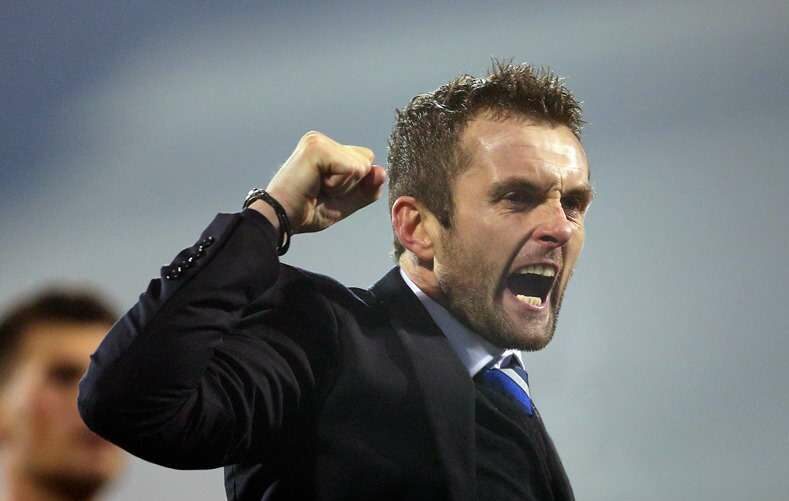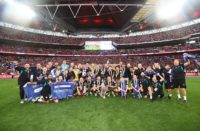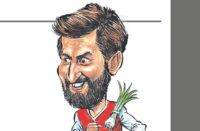NATHAN Jones was Oscar Garcia’s first-team coach at Brighton when he candidly laid bare his ambition.
“I want to be a top, top manager,” he told The FLP in 2014. “I don’t want to be mediocre. I don’t want to scratch around for jobs. I want to be world-class.
“I work 10-11 hours every day. I’m as highly qualified as it’s possible to be. I sacrifice massive parts of my life to learn as much as I can. Right now, I’m happy learning my trade. But I want to be a great manager and I won’t stop working towards that until I either achieve it or die.”
Talk about aiming high. But, when you’ve spent your youth in a Welsh pit village and overcome rejection to forge a career in football, where’s the sense in setting limits?
“Nathan is one of the most hard-working and determined people I’ve ever met,” said Darren Way, a team-mate at Yeovil. “He never stops wanting to improve and, when he sets his mind to something, he’s like a dog with a bone.”
Mind you, he’s had to be. Though technically and tactically adept, Jones’ slight build and 5ft 6in frame prompted plenty of scepticism as a youngster.
He signed for his schoolboy heroes Cardiff, and the Bluebirds prayed for a growth spurt before releasing him when their entreaties were unanswered. David Pleat’s Luton offered a contract but no games.
Jones, though, would not be deterred. In part, that steel came from his faith.
A born-again Christian, Jones has praying hands and the crucifixion tattooed on his left arm, Jesus Christ on his right bicep, and Michelangelo’s The Creation of Adam across his back.
He prays every morning and, in his formative years, refused to play on Sundays. “If you’ve lived with Christ then it’s impossible to turn away really,” he says. “It keeps you grounded. There are a lot of temptations, a lot of pitfalls nowadays, especially for a sportsman – and I think, through God’s guidance, I’ve been able to steer clear of them.
“Through the hard times I’ve always had the stability of the Lord in my life, and my family background has kept me on the straight and narrow. I believe everything is God’s will.”
Yet, if God provided a foundation, Jones’ belief in his own ability was undoubtedly hardened by a move to Colin Addison’s Badajoz in 1995. It was a plucky switch that would prove both revelatory and career-defining.
Spanish football’s measured pace suited Jones’ style. He made his professional debut for the second-tier club and, a year later, he was part of the Numancia side that won promotion to the Segunda. By year two, he was fluent in Spanish.
“I had to be,” he explains. “Nobody spoke a word of English so, if you didn’t learn, you couldn’t get involved in the banter or socialise off the pitch. I didn’t want to just stay in the background.”
More importantly, he saw first hand the focus on nutrition, the perfectionism of manager Antonio Gomes and the ceaseless focus on technique. It was there, on the arid plains of Northern Spain, that the coaching bug first bit.
 The FLP’s weekly profile is sponsored by Marathonbet: Odds here https://www.marathonbet.co.uk/en/
The FLP’s weekly profile is sponsored by Marathonbet: Odds here https://www.marathonbet.co.uk/en/
Jones would achieve plenty of success on the pitch. A player of the year award at Southend United in 2000, three promotions in five years at Brighton, a run to the League One play-offs with Yeovil, capped by that famous victory over Nottingham Forest.
Yet, even as he was charging forward from left-back or spraying passes around, the defender had on his coaching hat.
Nuggets passed on by the likes of Micky Adams, Steve Coppell and Gary Johnson were dispensed to youngsters on the training ground.
“He helped me a lot and always had something interesting to say,” said Ed Upson, a young defender at Yeovil, where Jones was handed a player-coach role under Terry Skiverton.
“I always thought he was different to other footballers. More thoughtful and analytical. And he’s on another level with his nutrition and his coaching. It was obvious he’d be a manager one day.”
Others, like Irish midfielder Stephen Maher, remember his impact in more psychological terms.
“The first season was very difficult for me,” said the 28-year-old, who played seven times for the Glovers. “I was young, away from home and found it difficult to settle and enjoy football.
“But Nathan was one of the guys who encouraged me everyday and gave me confidence. He was a leader, a winner, a great footballer and person, too. He gave everything in training, in games and appreciated being a footballer. I always appreciate the time he took to help me, something he didn’t have to do.”
Having formed an effective coaching triumvirate with Way and Skiverton, the return of Gary Johnson in 2012 forced a demoted Jones to re-evaluate. “I wanted to run my own team, to get my own philosophy together.” he said. “I wanted to coach every day and make mistakes.”
Charlton were the beneficiaries. Jones’ Under-21 side won a clutch of honours and the praise of Chris Powell before a switch to Brighton as assistant to Garcia.
Overlooked by the Seagulls following the Spaniard’s departure and subsequent sacking of Sami Hyypia, Jones joined Luton in January, the first slippy rung on that ladder to greatness.
“Nathan is an awesome coach,” said Lawrie Wilson, who worked under Jones at Charlton. “Tactically, it’s all there but it’s the enthusiasm that makes such a difference. He gets you going, makes learning enjoyable. As a player, you can’t ask any more. I hope he succeeds.”
FACTFILE
Born: Rhondda, Wales, 1973 (Age 42)
Career: A left-back, Jones came through the ranks at Cardiff but left, without making an appearance, to join Merthyr Tydfil in 1993. He then spent a year at Luton before joining Spanish Second Division side Badajoz. After 21 appearances, he dropped a division to join Numancia, with whom he won promotion in 1996-97.
Returning to England in 1997, Jones played 99 times for Southend, then joined Brighton on a free transfer in 2000. In five years at the Withdean, Jones scored seven goals in 183 games, winning promotion to Division Three in 2001, to Division Two the following season and, following relegation in 2003, a third promotion to the second tier via the play-offs in 2004.
Jones joined Gary Johnson’s Yeovil in 2005 and spent the remainder of his career at Huish Park, captaining the side in the 2007 League One play-off final at Wembley. By the time he retired in 2012, Jones had made more than 200 appearances for the Glovers. He then worked as assistant to Terry Skiverton and first-team coach under Gary Johnson before spending a year in charge of Charlton’s Under-21 side. After a move to Brighton in 2013, Jones assisted Oscar Garcia, Sami Hyypia and Chris Hughton, before being named Luton manager on January 6.
















